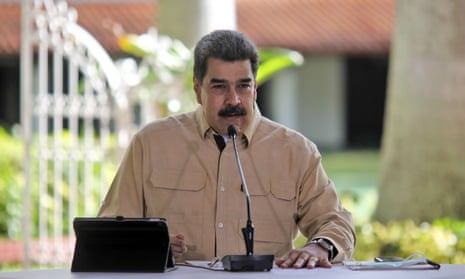Venezuela’s president and top ministers are responsible for probable crimes against humanity including extrajudicial killings and the systematic use of torture, UN investigators have concluded.
In a scathing, in-depth report published on Wednesday, the panel of experts said that they had found evidence that state actors including President Nicolás Maduro had ordered or contributed to crimes including extrajudicial executions, enforced disappearances, arbitrary detentions and torture.
The report highlighted grisly cases of torture and killings allegedly carried out by security forces who used techniques like electric shocks, genital mutilation and asphyxiation.
The findings, based on nearly 3,000 cases that were investigated or examined, concluded that Maduro and his defense and interior ministers were aware of crimes committed by security forces and intelligence agencies.
The report appeared likely to fan international and domestic criticism of Maduro’s government, which has overseen a country in tatters with runaway inflation, a violent crackdown and an exodus of millions of Venezuelans who have fled to neighboring countries to escape the turmoil since he took power in 2013.
Critics in other countries have already accused Maduro’s government of crimes against humanity. The 411-page report for the Human Rights Council represents an extensive look at rights violations in Venezuela and was based on interviews with victims, relatives, witnesses, police, government officials and judges, as well as videos, satellite imagery and social media content.
The authors said they did not receive responses from the government itself.
The experts – Marta Valinas of Portugal, Francisco Cox Vial of Chile, and Paul Seils of Britain – worked under a fact-finding mission the Geneva-based rights council set up last September to investigate alleged cruel, inhumane or degrading treatment and other human rights violations in Venezuela over the past five years
“These acts were committed pursuant to two state policies, one to quash opposition to the government and another to combat crime, including by eliminating individuals perceived as criminals,“ Valinas told reporters. “We also consider that the documented crimes were committed as part of a widespread and systematic attack against the civilian population.”
“For these reasons, the mission has reasonable grounds to believe that they amount to crimes against humanity,” she said, noting the alleged arbitrary killings and systematic use of torture, in particular. “Far from being isolated acts, these crimes were coordinated and committed pursuant to state policies, with the knowledge or direct support of commanding officers and senior government officials.”
The report found that members of the Special Action Forces, a feared division of the national police service, and another unit were responsible for over half of the thousands of wrongful deaths that the experts examined. Superiors had authority to grant officers a green light to kill, the report’s authors wrote, citing a training video that showed officers being encouraged to kill criminals without compassion.
In the report, the experts said the violations took place amid a breakdown of democratic institutions, rule of law and judicial independence in Venezuela. They said the great majority of unlawful killings by security forces have not resulted in prosecutions and “at no stage have officials with command responsibility been brought to justice,” according to a summary of the findings.
A report that the UN’s human rights chief, former Chilean president Michelle Bachelet, issued last year after a visit to Venezuela that included meeting Maduro said the government had registered nearly 5,300 killings in security operations linked to cases of “resistance to authority”. Bachelet also decried a “shockingly high” number of extrajudicial killings.
Under article 7 of the UN treaty establishing the International Criminal Court, a crime against humanity is defined as an act committed as part of a “widespread or systematic attack directed against any civilian population”.
